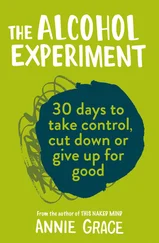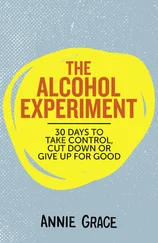Also, the unconscious mind often works without the knowledge or control of the conscious mind. 11Studies from as far back as 1970 prove our brains actually prepare for action 1/3 of a second before we consciously decide to act. This means that even when we think we are making conscious decisions, our unconscious mind actually makes the decision for us. 12
You can easily test this and reveal the extent to which your unconscious mind controls your conscious decisions. Remember a day when you were in a bad mood for no reason. You couldn’t pinpoint what was wrong; you just felt grumpy. If your conscious mind controlled your emotions, you could simply think, “I am going to be happy,” and your mood would change from grumpy to sunny. Have you tried that? Did it work?
When I am in a bad mood, a conscious thought to try to be happier—or, worse, someone telling me to just be happy—does nothing to improve my mood. It does the opposite. Why? Because your conscious mind doesn’t control your emotions. Granted, you can train your conscious mind in more positive or negative thought patterns, which ultimately alters how you feel. These repeated conscious thoughts eventually influence your unconscious and therefore your feelings.
So how does your unconscious mind feel about alcohol? Today’s society has conditioned your unconscious mind to believe alcohol provides pleasure, enjoyment, and support—that it is vital to social situations and stressful situations alike. This book reverses that conditioning by stripping away your false beliefs about alcohol. We will do this with the help of Liminal Thinking, a method developed by author Dave Gray. Liminal Thinking defines how, through the conscious exploration and acceptance of new ideas and truths, you can influence your unconscious mind. This gives you back your ability to make rational and logical decisions about alcohol, no longer influenced by illogical, emotional, or irrational desires. It will give you control and freedom by changing your understanding of and therefore your relationship with alcohol. While tradition, advertising, and societal norms condition our unconscious to believe that alcohol is beneficial, Liminal Thinking and the material in this book will expose that unconscious conditioning and recondition your unconscious, exposing alcohol and giving you freedom.
Experience and the Unconscious Mind 13
In order to influence the unconscious mind, we need to first talk about the way in which personal experience ties to the unconscious. Perhaps you’ve heard the ancient story about the blind men and the elephant. Three blind men are brought into a room with an elephant, and each man touches a different part. One touches the tail, one the trunk, and one the side. When asked what they are touching they begin to argue. The one touching the trunk believes he is touching a snake; the one touching the body, a wall; and the one touching the tail, a rope.
Each blind man is saying what he believes to be true. And their experience proves it. Since we tend to trust our experiences implicitly, we understand how the argument started. Of course, the truth is that none of them are correct. They are all experiencing a piece of reality and forming their own, very different, opinions.
Gray explains that we only see and experience part of reality, and no matter how many experiences we have had, our brains are not powerful enough to experience and observe everything. Gray makes the point that we are limited by what we pay attention to: “In any given moment, the more you focus on one aspect of your experience, the less you notice everything else.” 14We usually notice only the things specific to our immediate reality: the society we grew up in, the media, the influencers in our lives, and our actual life experiences.
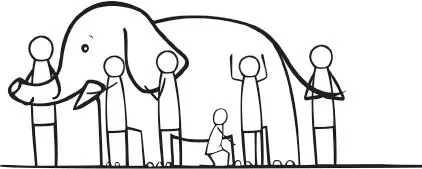
Gray states that upon those relevant experiences and observations we make assumptions, from those assumptions we draw conclusions, and from those conclusions we form beliefs. 15Gray defines belief as everything we “know” to be true. 16
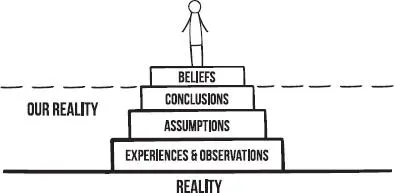
This illustration demonstrates that the things we “know” to be true are not actually formed by reality, but by reality as we have interpreted it from our experiences, observations, assumptions, and conclusions. Consider how this applies to alcohol. Collectively held beliefs are not built directly on the foundation of reality.
These beliefs can include statements like:
• Alcohol provides enjoyment.
• Alcohol provides relief.
• Alcohol is the key to social situations.
• A party can’t really be a party without booze.
• Alcohol makes us funnier or more creative.
• Alcohol can relieve our stress or boredom.
• For some it can be hard, if not impossible, to stop drinking.
• The very definition of alcoholic and alcoholism.
These beliefs can be particularly difficult to change for several reasons. One reason is that we unconsciously self-seal them by seeking out things that are congruent with them. This is called confirmation bias, the tendency to search for or interpret information in a way that confirms one’s preconceptions. We can find confirmation for our preconceptions about alcohol in many forms, including the media, the people we drink with, and our internal rationalizations. Adages about drinking found hanging in so many households illustrate a confirmation bias. Some of my favorites are:
• It’s not drinking alone if the kids are home.
• We have too much wine, said no one ever.
• It’s not a hangover; it’s wine flu.
• I cook with wine; sometimes I even put it in the food.
• Wine! Because no great story started with someone eating a salad.
The kicker is that these beliefs have become so ingrained in our minds and our society, and so repeatedly self-sealed, that they are programmed into our unconscious. And our unconscious controls our emotions and our desires. 17By definition the unconscious is not readily accessible or easily changed. 18We need a specific process to dive into the foundation of our beliefs, examine them, and change our perceived reality.
So what happens when your experiences with alcohol start to contradict your bubble of self-sealing belief? Perhaps your experiences are no longer wholly positive, and you start to question your drinking. Or maybe you hear new information about the dangers of drinking.
Gray says that one of the ways we make sense of these new ideas that don’t fit with our current beliefs is to look for external validity. Can we take the new information and test it out to prove its merit? However, especially with alcohol, we often don’t make it that far. This is because the new information doesn’t have internal coherence— it doesn’t fit with what you “know” to be true. And because it is lacking in internal coherence, you will unconsciously reject it before you have a chance to consciously consider it . This happens all the time. We both consciously and unconsciously disregard information we don’t want to hear. And when we do this, we never have a chance to see if this new information is indeed true; we never move to test it against reality. 19
Why does this happen? Because we like certainty; it feels safe. Gray explains this unconscious behavior helps us deal with the realities of life, many of which are uncomfortable. It allows us to outsource some of the fear that attacks us when we confront certain truths. Reality is uncertain, and uncertainty causes fear. We try to protect ourselves from this fear by staying inside our bubble of belief until something happens that we cannot ignore. At that point we are forced to confront reality.
Читать дальше
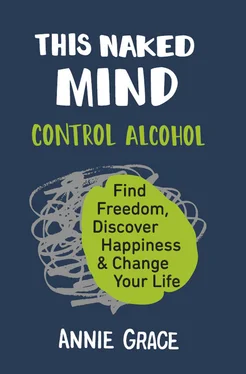



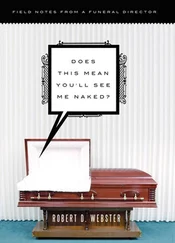

![Джон Харгрейв - Mind Hacking [How to Change Your Mind for Good in 21 Days]](/books/404192/dzhon-hargrejv-mind-hacking-how-to-change-your-min-thumb.webp)

